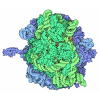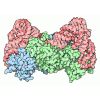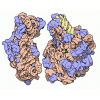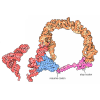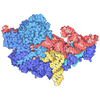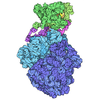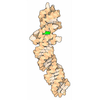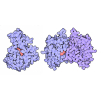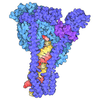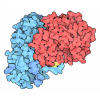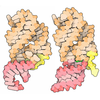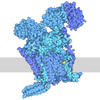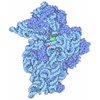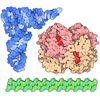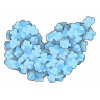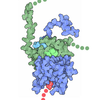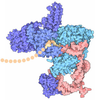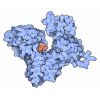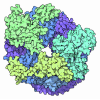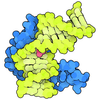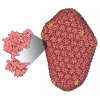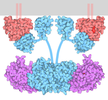[English] 日本語
 Yorodumi
Yorodumi- PDB-8oj5: 60S ribosomal subunit bound to the E3-UFM1 complex - state 3 (in-... -
+ Open data
Open data
- Basic information
Basic information
| Entry | Database: PDB / ID: 8oj5 | ||||||||||||||||||
|---|---|---|---|---|---|---|---|---|---|---|---|---|---|---|---|---|---|---|---|
| Title | 60S ribosomal subunit bound to the E3-UFM1 complex - state 3 (in-vitro reconstitution) | ||||||||||||||||||
 Components Components |
| ||||||||||||||||||
 Keywords Keywords | RIBOSOME / ER / UFMylation / recycling | ||||||||||||||||||
| Function / homology |  Function and homology information Function and homology informationpositive regulation of I-kappaB phosphorylation / UFM1 ligase activity / UFM1-modified protein reader activity / positive regulation of reticulophagy / regulation of phosphatase activity / apoptotic nuclear changes / definitive erythrocyte differentiation / UFM1 transferase activity / negative regulation of protein serine/threonine kinase activity / positive regulation of protein localization to endoplasmic reticulum ...positive regulation of I-kappaB phosphorylation / UFM1 ligase activity / UFM1-modified protein reader activity / positive regulation of reticulophagy / regulation of phosphatase activity / apoptotic nuclear changes / definitive erythrocyte differentiation / UFM1 transferase activity / negative regulation of protein serine/threonine kinase activity / positive regulation of protein localization to endoplasmic reticulum / : / protein K69-linked ufmylation / protein ufmylation / negative regulation of protein kinase activity by regulation of protein phosphorylation / positive regulation of plasma cell differentiation / negative regulation of IRE1-mediated unfolded protein response / regulation of proteasomal ubiquitin-dependent protein catabolic process / positive regulation of cell cycle G1/S phase transition / negative regulation of T cell mediated immune response to tumor cell / protein localization to endoplasmic reticulum / negative regulation of T cell activation / regulation of intracellular estrogen receptor signaling pathway / translation at presynapse / exit from mitosis / optic nerve development / positive regulation of proteasomal protein catabolic process / regulation of cyclin-dependent protein serine/threonine kinase activity / mitotic G2/M transition checkpoint / response to insecticide / eukaryotic 80S initiation complex / negative regulation of protein neddylation / regulation of translation involved in cellular response to UV / axial mesoderm development / negative regulation of formation of translation preinitiation complex / regulation of G1 to G0 transition / retinal ganglion cell axon guidance / cartilage development / Transferases; Acyltransferases; Aminoacyltransferases / ribosomal protein import into nucleus / protein-DNA complex disassembly / ribosome disassembly / positive regulation of intrinsic apoptotic signaling pathway in response to DNA damage by p53 class mediator / response to L-glutamate / regulation of canonical NF-kappaB signal transduction / 90S preribosome assembly / mitogen-activated protein kinase binding / regulation of neuron differentiation / reticulophagy / alpha-beta T cell differentiation / GAIT complex / positive regulation of DNA damage response, signal transduction by p53 class mediator / TORC2 complex binding / G1 to G0 transition / middle ear morphogenesis / negative regulation of protein import into nucleus / : / cytoplasmic side of rough endoplasmic reticulum membrane / negative regulation of ubiquitin protein ligase activity / homeostatic process / negative regulation of PERK-mediated unfolded protein response / mitotic G2 DNA damage checkpoint signaling / negative regulation of MAP kinase activity / negative regulation of protein phosphorylation / macrophage chemotaxis / lung morphogenesis / positive regulation of natural killer cell proliferation / male meiosis I / ubiquitin-like protein ligase binding / Protein hydroxylation / Peptide chain elongation / Selenocysteine synthesis / positive regulation of glial cell proliferation / Formation of a pool of free 40S subunits / cellular response to actinomycin D / RHOA GTPase cycle / Eukaryotic Translation Termination / blastocyst development / negative regulation of ubiquitin-dependent protein catabolic process / SRP-dependent cotranslational protein targeting to membrane / Response of EIF2AK4 (GCN2) to amino acid deficiency / hematopoietic stem cell differentiation / ubiquitin ligase inhibitor activity / Viral mRNA Translation / positive regulation of signal transduction by p53 class mediator / NF-kappaB binding / protein localization to nucleus / Nonsense Mediated Decay (NMD) independent of the Exon Junction Complex (EJC) / GTP hydrolysis and joining of the 60S ribosomal subunit / L13a-mediated translational silencing of Ceruloplasmin expression / positive regulation of protein binding / ubiquitin-like ligase-substrate adaptor activity / Major pathway of rRNA processing in the nucleolus and cytosol / protein targeting / endoplasmic reticulum unfolded protein response / protein-RNA complex assembly / Nonsense Mediated Decay (NMD) enhanced by the Exon Junction Complex (EJC) / maturation of LSU-rRNA / rough endoplasmic reticulum / endomembrane system / Maturation of protein E Similarity search - Function | ||||||||||||||||||
| Biological species |  Homo sapiens (human) Homo sapiens (human) | ||||||||||||||||||
| Method | ELECTRON MICROSCOPY / single particle reconstruction / cryo EM / Resolution: 2.9 Å | ||||||||||||||||||
 Authors Authors | Penchev, I. / DaRosa, P.A. / Peter, J.J. / Kulathu, Y. / Becker, T. / Beckmann, R. / Kopito, R. | ||||||||||||||||||
| Funding support | European Union,  Germany, Germany,  United Kingdom, United Kingdom,  United States, 5items United States, 5items
| ||||||||||||||||||
 Citation Citation |  Journal: Nature / Year: 2024 Journal: Nature / Year: 2024Title: UFM1 E3 ligase promotes recycling of 60S ribosomal subunits from the ER. Authors: Paul A DaRosa / Ivan Penchev / Samantha C Gumbin / Francesco Scavone / Magda Wąchalska / Joao A Paulo / Alban Ordureau / Joshua J Peter / Yogesh Kulathu / J Wade Harper / Thomas Becker / ...Authors: Paul A DaRosa / Ivan Penchev / Samantha C Gumbin / Francesco Scavone / Magda Wąchalska / Joao A Paulo / Alban Ordureau / Joshua J Peter / Yogesh Kulathu / J Wade Harper / Thomas Becker / Roland Beckmann / Ron R Kopito /    Abstract: Reversible modification of target proteins by ubiquitin and ubiquitin-like proteins (UBLs) is widely used by eukaryotic cells to control protein fate and cell behaviour. UFM1 is a UBL that ...Reversible modification of target proteins by ubiquitin and ubiquitin-like proteins (UBLs) is widely used by eukaryotic cells to control protein fate and cell behaviour. UFM1 is a UBL that predominantly modifies a single lysine residue on a single ribosomal protein, uL24 (also called RPL26), on ribosomes at the cytoplasmic surface of the endoplasmic reticulum (ER). UFM1 conjugation (UFMylation) facilitates the rescue of 60S ribosomal subunits (60S) that are released after ribosome-associated quality-control-mediated splitting of ribosomes that stall during co-translational translocation of secretory proteins into the ER. Neither the molecular mechanism by which the UFMylation machinery achieves such precise target selection nor how this ribosomal modification promotes 60S rescue is known. Here we show that ribosome UFMylation in vivo occurs on free 60S and we present sequential cryo-electron microscopy snapshots of the heterotrimeric UFM1 E3 ligase (E3(UFM1)) engaging its substrate uL24. E3(UFM1) binds the L1 stalk, empty transfer RNA-binding sites and the peptidyl transferase centre through carboxy-terminal domains of UFL1, which results in uL24 modification more than 150 Å away. After catalysing UFM1 transfer, E3(UFM1) remains stably bound to its product, UFMylated 60S, forming a C-shaped clamp that extends all the way around the 60S from the transfer RNA-binding sites to the polypeptide tunnel exit. Our structural and biochemical analyses suggest a role for E3(UFM1) in post-termination release and recycling of the large ribosomal subunit from the ER membrane. | ||||||||||||||||||
| History |
|
- Structure visualization
Structure visualization
| Structure viewer | Molecule:  Molmil Molmil Jmol/JSmol Jmol/JSmol |
|---|
- Downloads & links
Downloads & links
- Download
Download
| PDBx/mmCIF format |  8oj5.cif.gz 8oj5.cif.gz | 3.6 MB | Display |  PDBx/mmCIF format PDBx/mmCIF format |
|---|---|---|---|---|
| PDB format |  pdb8oj5.ent.gz pdb8oj5.ent.gz | Display |  PDB format PDB format | |
| PDBx/mmJSON format |  8oj5.json.gz 8oj5.json.gz | Tree view |  PDBx/mmJSON format PDBx/mmJSON format | |
| Others |  Other downloads Other downloads |
-Validation report
| Arichive directory |  https://data.pdbj.org/pub/pdb/validation_reports/oj/8oj5 https://data.pdbj.org/pub/pdb/validation_reports/oj/8oj5 ftp://data.pdbj.org/pub/pdb/validation_reports/oj/8oj5 ftp://data.pdbj.org/pub/pdb/validation_reports/oj/8oj5 | HTTPS FTP |
|---|
-Related structure data
| Related structure data |  16905MC  8ohdC  8oj0C  8oj8C C: citing same article ( M: map data used to model this data |
|---|---|
| Similar structure data | Similarity search - Function & homology  F&H Search F&H Search |
- Links
Links
- Assembly
Assembly
| Deposited unit | 
|
|---|---|
| 1 |
|
- Components
Components
-RNA chain , 3 types, 3 molecules 578
| #1: RNA chain | Mass: 1640166.875 Da / Num. of mol.: 1 / Source method: isolated from a natural source / Source: (natural)  Homo sapiens (human) / Cell line: HEK293T Homo sapiens (human) / Cell line: HEK293T |
|---|---|
| #2: RNA chain | Mass: 38998.078 Da / Num. of mol.: 1 / Source method: isolated from a natural source / Source: (natural)  Homo sapiens (human) / Cell line: HEK293T / References: GenBank: 23898 Homo sapiens (human) / Cell line: HEK293T / References: GenBank: 23898 |
| #3: RNA chain | Mass: 50449.812 Da / Num. of mol.: 1 / Source method: isolated from a natural source / Source: (natural)  Homo sapiens (human) / Cell line: HEK293T / References: GenBank: 555853 Homo sapiens (human) / Cell line: HEK293T / References: GenBank: 555853 |
-Protein , 6 types, 6 molecules ABCDLILm
| #4: Protein | Mass: 89722.203 Da / Num. of mol.: 1 Source method: isolated from a genetically manipulated source Source: (gene. exp.)  Homo sapiens (human) / Gene: UFL1, KIAA0776, MAXER, NLBP, RCAD / Production host: Homo sapiens (human) / Gene: UFL1, KIAA0776, MAXER, NLBP, RCAD / Production host:  References: UniProt: O94874, Transferases; Acyltransferases; Aminoacyltransferases |
|---|---|
| #5: Protein | Mass: 56977.395 Da / Num. of mol.: 1 Source method: isolated from a genetically manipulated source Source: (gene. exp.)  Homo sapiens (human) / Gene: CDK5RAP3, IC53, LZAP, MSTP016, OK/SW-cl.114, PP1553 / Production host: Homo sapiens (human) / Gene: CDK5RAP3, IC53, LZAP, MSTP016, OK/SW-cl.114, PP1553 / Production host:  |
| #6: Protein | Mass: 35663.840 Da / Num. of mol.: 1 Source method: isolated from a genetically manipulated source Source: (gene. exp.)  Homo sapiens (human) / Gene: DDRGK1, C20orf116, UFBP1 / Production host: Homo sapiens (human) / Gene: DDRGK1, C20orf116, UFBP1 / Production host:  |
| #7: Protein | Mass: 9128.552 Da / Num. of mol.: 1 Source method: isolated from a genetically manipulated source Source: (gene. exp.)  Homo sapiens (human) / Gene: UFM1, C13orf20, BM-002 / Production host: Homo sapiens (human) / Gene: UFM1, C13orf20, BM-002 / Production host:  |
| #16: Protein | Mass: 24552.910 Da / Num. of mol.: 1 / Source method: isolated from a natural source / Source: (natural)  Homo sapiens (human) / Cell line: HEK293T / References: UniProt: Q96L21 Homo sapiens (human) / Cell line: HEK293T / References: UniProt: Q96L21 |
| #45: Protein | Mass: 14758.394 Da / Num. of mol.: 1 / Source method: isolated from a natural source / Source: (natural)  Homo sapiens (human) / Cell line: HEK293T / References: UniProt: P62987 Homo sapiens (human) / Cell line: HEK293T / References: UniProt: P62987 |
+60S ribosomal protein ... , 40 types, 40 molecules LALBLCLDLELFLGLHLJLLLMLNLOLPLQLRLSLTLULVLWLXLYLZLaLbLcLdLeLf...
-Non-polymers , 2 types, 225 molecules 


| #50: Chemical | ChemComp-MG / #51: Chemical | ChemComp-ZN / |
|---|
-Details
| Has ligand of interest | N |
|---|
-Experimental details
-Experiment
| Experiment | Method: ELECTRON MICROSCOPY |
|---|---|
| EM experiment | Aggregation state: PARTICLE / 3D reconstruction method: single particle reconstruction |
- Sample preparation
Sample preparation
| Component | Name: E3-UFM1 complex bound to the 60S ribosome / Type: RIBOSOME / Entity ID: #1-#49 / Source: NATURAL |
|---|---|
| Molecular weight | Experimental value: NO |
| Source (natural) | Organism:  Homo sapiens (human) Homo sapiens (human) |
| Buffer solution | pH: 7 |
| Specimen | Embedding applied: NO / Shadowing applied: NO / Staining applied: NO / Vitrification applied: YES |
| Vitrification | Instrument: FEI VITROBOT MARK IV / Cryogen name: ETHANE |
- Electron microscopy imaging
Electron microscopy imaging
| Experimental equipment |  Model: Titan Krios / Image courtesy: FEI Company |
|---|---|
| Microscopy | Model: FEI TITAN KRIOS |
| Electron gun | Electron source:  FIELD EMISSION GUN / Accelerating voltage: 300 kV / Illumination mode: OTHER FIELD EMISSION GUN / Accelerating voltage: 300 kV / Illumination mode: OTHER |
| Electron lens | Mode: BRIGHT FIELD / Nominal defocus max: 2000 nm / Nominal defocus min: 800 nm |
| Image recording | Electron dose: 50 e/Å2 / Film or detector model: GATAN K3 BIOQUANTUM (6k x 4k) |
- Processing
Processing
| CTF correction | Type: PHASE FLIPPING AND AMPLITUDE CORRECTION |
|---|---|
| 3D reconstruction | Resolution: 2.9 Å / Resolution method: FSC 0.143 CUT-OFF / Num. of particles: 35935 / Symmetry type: POINT |
| Atomic model building | Protocol: AB INITIO MODEL |
 Movie
Movie Controller
Controller






 PDBj
PDBj